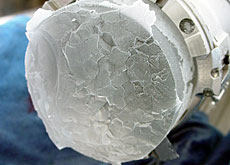
Bern researchers drill deep into climate history

Scientists from Bern University have found there is more carbon dioxide (CO2) in the atmosphere today than at any time during the past 650,000 years.
Drilling more than 3,200 metres into Antarctic ice, they have produced a major new study into greenhouse gases that may fuel global warming.
A previous ice-core sample had traced greenhouse gases back about 440,000 years. The new sample goes 210,000 years further back in time.
Working with researchers from other European countries, the team has been analysing tiny air bubbles preserved in the ice for millennia.
Extracting the air permits a direct measurement of the atmosphere at past points in time.
The drilling took place at a research camp called Dome Concordia in East Antarctica, where temperatures go down to minus 50 degrees Celsius.
The findings highlight how people are dramatically influencing the build-up of greenhouse gases.
The study, part of the European Project for Ice Coring in Antarctica, was published on Friday in the United States journal, Science.
Higher concentrations
“Today’s concentrations of carbon dioxide are 27 per cent higher than at any time in the past 650,000 years,” commented Thomas Stocker, a professor of climate and environmental physics at Bern University and lead researcher.
“Those of methane are 130 per cent higher,” he added.
Sceptics sometimes dismiss the rise of greenhouse gases as part of a naturally fluctuating cycle but the new study disproves that theory.
Stocker said the rise was taking place at a speed that was “over a factor of a hundred faster than anything we are seeing in the natural cycles”.
“It puts the present changes in context,” he added.
A lengthening history of greenhouse concentrations should help climate specialists build better models about what the future might bring, Stocker said.
It might also give answers to such questions as how long ago humans started influencing greenhouse gas accumulations, and what impact other factors such as ocean currents play in the complexities of climate change.
swissinfo with agencies
EPICA is a multinational European project for deep ice core drilling in Antarctica.
The participating countries are Switzerland, Belgium, Britain, Denmark, France, Germany, Italy, the Netherlands, Norway and Sweden.
Its main objective is to obtain full documentation of the climatic and atmospheric record archived in Antarctic ice by drilling and analysing two ice cores and comparing these with their Greenland counterparts.
The lead researcher was Professor Thomas Stocker from Bern University’s Physics Institute.

In compliance with the JTI standards
More: SWI swissinfo.ch certified by the Journalism Trust Initiative




























You can find an overview of ongoing debates with our journalists here . Please join us!
If you want to start a conversation about a topic raised in this article or want to report factual errors, email us at english@swissinfo.ch.